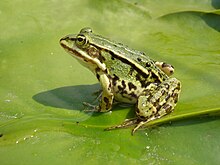欧洲水蛙
欧洲水蛙(Pelophylax kl. esculentus)[1][2]是一种常见的欧洲蛙类。此种蛙类常被人做为食材,如法国菜青蛙腿就是主要使用以此物种。此类蛙种的成蛙雌性身长在5至9公分,雄性则在6至11公分。
| 欧洲水蛙 | |
|---|---|

| |
| 科学分类 | |
| 界: | 动物界 Animalia |
| 门: | 脊索动物门 Chordata |
| 纲: | 两栖纲 Amphibia |
| 目: | 无尾目 Anura |
| 科: | 赤蛙科 Ranidae |
| 属: | 侧褶蛙属 Pelophylax |
| 种: | 欧洲水蛙 P. lessonae♂ × P. ridibundus♀
|
| 二名法 | |
| Pelophylax kl. esculentus | |
| 异名 | |
|
Pelophylax esculentus (Linnaeus, 1758) | |
分布
编辑欧洲水蛙主要栖息于欧洲,原产于法国北部、俄罗斯西部、爱沙尼亚、丹麦、保加利亚,及意大利北部。后被引入西班牙[来源请求]及英国[来源请求]。其自然分布与莱桑池蛙几乎相同[3]。
杂合发育
编辑- 主条目:欧洲水蛙的杂合发育
欧洲水蛙是池蛙(Pelophylax lessonae)和沼蛙(Pelophylax ridibundus)杂合发育而成[4][5][6][7][8][9][10]。它透过杂交繁殖(hemiclonally).[4][5][6][7][8],意指杂交物种在配子生成阶段,会排除父系或母系其中一方的基因型,因此生成的配子基因组并没有经过遗传重组,所有基因皆来自于单一物种[5][6][8]。
杂交繁殖意味着在形成配子的过程中,杂种(RL基因型)是排除一个亲本基因组(L或R),并产生具有其他亲本物种(R或L)的未组合基因组的配子,而不是含有混合重组的亲本基因组。
混合种群通常通过与同源亲本物种(P.sononae(LL)或P. ridibundus(RR))交配(回交)繁殖,提供第二个丢弃的亲本基因组(分别为L或R)地方。因此,杂交是繁殖的无性繁殖模式;将一半的基因组直接复制,并未组合(完整)的传接到下一代。 [11][7][8]
例如:在最普遍的所谓的L-E系统中,欧洲水蛙(Pelophylax kl. esculentus)(RE)产生沼蛙(P. ridibundus)(R)的配子,与共存的池蛙Pelophylax lessonae(L配子)配对 - 见下文中间。
因为这种杂种需要有另外一个分类群作为一个有性繁殖的主体,通常是父母种之一,而且它是遗传窃贼(klepton)的实验的产物。因此增加了“kl”(为克莱顿)在物种的名称。
还有已知全部杂交种群中,二倍体杂种(LR)与三倍体(LLR或LRR)杂种共存,分别提供L或R基因组。在这种情况下,二倍体杂种(LR)不仅产生单倍体R或L配子,还重新产生三倍体所需的二倍体配子(RL)。
-
在水中游泳的青蛙
-
两只雄蛙的假性交配
-
欧洲水蛙同类相食
-
头部特写
-
从另一个角度的头部特写
-
在人类手臂上的欧洲水蛙
-
在池塘栖地的欧洲水蛙
-
在沼泽的欧洲水蛙
参考文献
编辑- ^ Frost, Darrel R. Amphibian Species of the World: an Online Reference. Version 4. American Museum of Natural History, New York, USA. 2006 [17 August 2006]. (原始内容存档于2007-10-24).
- ^ Frost, Grant, Faivovich, Bain, Haas, Haddad, de Sá, Channing, Wilkinson, Donnellan, Raxworthy, Campbell, Blotto, Moler, Drewes, Nussbaum, Lynch, Green, and Wheeler 2006. The amphibian tree of life. Bulletin of the American Museum of Natural History. Number 297. New York. Issued March 15, 2006.
- ^ Pelophylax esculentus, Edible Frog. AmphibiaWeb. [28 January 2014]. (原始内容存档于2014-02-02).
- ^ 4.0 4.1 Berger, L. Some characteristics of the crossess within Rana esculenta complex in postlarval development. Ann. Zool. 1970, 27: 374–416.
- ^ 5.0 5.1 5.2 Holsbeek, G.; Jooris, R. Potential impact of genome exclusion by alien species in the hybridogenetic water frogs (Pelophylax esculentus complex) (PDF). Biol Invasions (Springer Netherlands). 2010, 12: 1–13 [2015-06-21]. ISSN 1387-3547. doi:10.1007/s10530-009-9427-2. (原始内容 (PDF)存档于2019-07-13).
- ^ 6.0 6.1 6.2 Christiansen D. G. Gamete types, sex determination and stable equilibria of all-hybrid populations of diploid and triploid edible frogs (Pelophylax esculentus) Rana esculenta as deduced from mtDNA analyses.. BMC Evolutionary Biology. 2009, 9 (135) [2012-07-25]. PMC 2709657 . PMID 19527499. doi:10.1186/1471-2148-9-135. (原始内容存档于2015-09-23).
- ^ 7.0 7.1 7.2 Vorburger, Christoph; Reyer, Heinz-Ulrich. A genetic mechanism of species replacement in European waterfrogs? (PDF). Conservation Genetics (Kluwer Academic Publishers). 2003, 4: 141–155 [2015-06-21]. ISSN 1566-0621. doi:10.1023/A:1023346824722. (原始内容 (PDF)存档于2020-01-18).
- ^ 8.0 8.1 8.2 8.3 Ragghianti M, Bucci S, Marracci S, Casola C, Mancino G, Hotz H, Guex GD, Plötner J, Uzzell T. Gametogenesis of intergroup hybrids of hemiclonal frogs. (PDF). Genet Res. February 2007, 89 (1): 39–45 [2012-07-25]. doi:10.1017/S0016672307008610. (原始内容存档 (PDF)于2016-06-25).
- ^ http://digimuse.nmns.edu.tw/Default.aspx?tabid=414&ObjectId=0b00000181e3ff36&Domin=z&Field=a1&ContentType=Exhibit&Language=CHI&FieldName=
- ^ 兩生類學習資源 ->青蛙和蟾蜍個論 ->保育與環境. 国立自然科学博物馆. [2017-05-22].
- ^ Simon J.-C.; Delmotte F.; Rispe C.; Crease T. Phylogenetic relationships between parthenogens and their sexual relatives: the possible routes to parthenogenesis in animals. (PDF). Biological Journal of the Linnean Society. 2003, 79: 151–163 [2012-07-30]. doi:10.1046/j.1095-8312.2003.00175.x. (原始内容存档 (PDF)于2020-01-18).
外部链接
编辑- ArchéoZooThèque:欧洲水蛙的骨骼绘图[永久失效链接] 有提供向量档、图片党、pdf格式。
- 在 HerpFrance.com 的物种号 (页面存档备份,存于互联网档案馆)
- YouTube上的影片:池蛙和杂种青蛙 (页面存档备份,存于互联网档案馆)。欧洲水蛙和池蛙混杂交配;池蛙是草绿色且体态较小。
